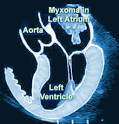Increasing dietary magnesium intake is associated with a reduced risk of stroke, heart failure, diabetes, and all-cause mortality…
I developed chronic atrial fibrillation (afib) in the fall of 2010. My ejection fraction is now about 50. The first thing everyone diagnosed with atrial fibrillation learns is that the condition increases your risk of stroke.
According to the Centers for Disease Control and Prevention between 2.7 and 6.1 people are living in the United States with atrial fibrillaton. That is a lot of people living with an increased risk of stroke.
And with the American population getting older, that figure can only increase.

I should also mention that I am a long-term cancer survivor. Living with the many side effects from my conventional therapies has made me vigilant about my health. I have learned that while modern medicine can offer many different therapies for many different health issues, it is the individual’s lifestyle choices that can make all the difference. In other words, just taking a blood thinner like Eliquis or Wafarin doesn’t mean that you don’t have to make healthy living a priority.

I exercise, I eat right (nuts are a great source of magnesium), and I take magnesium to reduce this risk of stoke. As you can read from the three studies linked and excerpted below, magnesium is an important componant of your heart health and minimizing stroke risk.
I take and recommend Life Extension Neuro Mag Magnesium Threonate 144 mg daily. I have found all of the Life Extension supplements that I take are evaluated and approved by Consumerlab.com.
Do you have afib? If you would like to learn more about evidence-based therapies to improve your heart health, scroll down the page, post a question or comment and I will reply to you ASAP.
Thank you,
David Emerson
- Cancer Survivor
- Cancer Coach
- Director PeopleBeatingCancer
Recommended Reading:
“We conducted a dose-response meta-analysis to summarize the evidence regarding the association between magnesium intake and stroke risk.
Results: Seven prospective studies, with 6477 cases of stroke and 241,378 participants, were eligible for inclusion in the meta-analysis. We observed a modest but statistically significant inverse association between magnesium intake and risk of stroke. An intake increment of 100 mg Mg/d was associated with an 8% reduction in risk of total stroke (combined RR: 0.92; 95% CI: 0.88, 0.97), without heterogeneity among studies (P = 0.66, I(2) = 0%). Magnesium intake was inversely associated with risk of ischemic stroke (RR: 0.91; 95% CI: 0.87, 0.96) but not intracerebral hemorrhage (RR: 0.96; 95% CI: 0.84, 1.10) or subarachnoid hemorrhage (RR: 1.01; 95% CI: 0.90, 1.14).
CONCLUSION: Dietary magnesium intake is inversely associated with risk of stroke, specifically ischemic stroke.”
“Results– Forty prospective cohort studies totaling more than 1 million participants were included in the analysis. During the follow-up periods (ranging from 4 to 30 years), 7678 cases of CVD, 6845 cases of coronary heart disease (CHD), 701 cases of heart failure, 14,755 cases of stroke, 26,299 cases of T2D, and 10,983 deaths were reported. No significant association was observed between increasing dietary magnesium intake (per 100 mg/day increment) and the risk of total CVD (RR: 0.99; 95% CI, 0.88–1.10) or CHD (RR: 0.92; 95% CI, 0.85–1.01). However, the same incremental increase in magnesium intake was associated with a 22% reduction in the risk of heart failure (RR: 0.78; 95% CI, 0.69–0.89) and a 7% reduction in the risk of stroke (RR: 0.93; 95% CI, 0.89–0.97). Moreover, the summary relative risks of T2D and mortality per 100 mg/day increment in magnesium intake were 0.81 (95% CI, 0.77–0.86) and 0.90 (95% CI, 0.81–0.99), respectively.
Conclusions- Increasing dietary magnesium intake is associated with a reduced risk of stroke, heart failure, diabetes, and all-cause mortality, but not CHD or total CVD. These findings support the notion that increasing dietary magnesium might provide health benefits.
How Much Magnesium Is Enough?
The recommended dietary allowance (RDA) for magnesium — meaning the amount you should take in each day — varies depending on your age and sex. On average, the RDA is 400 milligrams (mg) for men ages 19 to 30, and lower (310 mg) for women of the same age. For those 31 and older, men should get 420 mg of magnesium daily, and women should get 320 mg daily…





